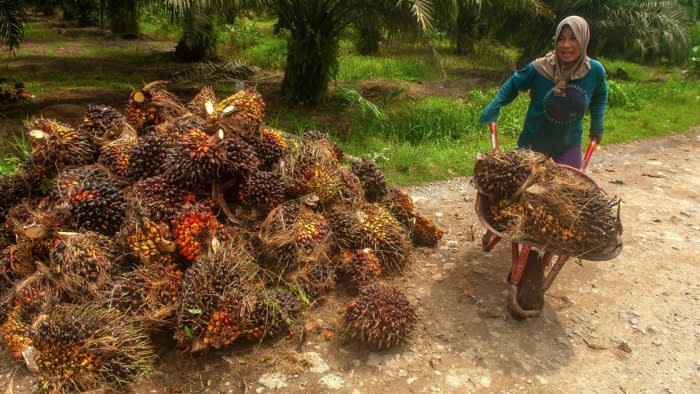Unlock the Editor’s Digest for free
Roula Khalaf, Editor of the FT, selects her favourite stories in this weekly newsletter.
Brussels intends to postpone a controversial anti-deforestation law for a year in response to growing concerns from trading partners, the European Commission has said.
“Given feedback received from international partners about their state of preparations, the commission also proposes to give concerned parties additional time to prepare,” it said on Wednesday, while publishing compliance guidance for exporters.
The proposal must be approved by the European parliament and member states before the law is supposed to come into force on December 30. It would then be implemented 12 months later.
The law, which is intended to stop European consumers contributing to deforestation, stipulates that commodities including coffee, cocoa, rubber, wood and palm oil cannot enter the bloc if they are grown in deforested areas.
Last week, 27 European business associations representing farmers, magazine publishers and manufacturers called for a delay in its implementation, echoing demands by several countries including Germany. Other industry groups warned of shortages and price rises for staple goods including coffee, soyabeans, beef and rubber.
Manfred Weber, head of the European People’s party, the EU’s biggest political party which counts commission president Ursula von der Leyen as a member, welcomed the move to delay what he called “a bureaucratic monster”.
Leading commodity producers such as Brazil and India have attacked the laws as protectionist, while palm oil growers in Indonesia said they may not be able to comply with the legislation as they are still awaiting government permission to share geolocation information.
But green groups condemned the proposed delay. “It’s an act of nature vandalism that will serve only to drive more industrial destruction of tropical forests, threatening the people and wildlife who depend on them, while pushing climate and nature goals out of reach,” said Julian Oram, senior policy director at the advocacy organisation Mighty Earth.
“This smacks of President Ursula von der Leyen kowtowing to agribusiness lobbyists acting in the interests of their worst members, who whine about not being able to comply in time.”
The commission also set out on Wednesday how it will assess whether countries will be deemed, high, medium or low risk, which dictates how heavily their exports will be policed. “A large majority of countries worldwide will be classified as ‘low-risk’,” it said.
Many producing countries including Thailand, Vietnam and Brazil have already put in place measures they hope will comply with the rules and some companies have urged swift implementation.
But Fediol, which represents the EU vegetable oil industry, privately warned members that importers risked “being non-compliant with the national law of the producing country in order to be compliant with the EU Deforestation Regulation”, according to an internal briefing officials said referred to Indonesia.
“The alternative is that operators may no longer source from such countries, leading to important supply shortages,” it added.
Indonesia is the EU’s biggest palm oil supplier, accounting for about 40 per cent of the bloc’s imports of the commodity, which is used in a range of food, cosmetic and pharmaceutical products. The Indonesian Palm Oil Association, a trade group representing producers, in September asked for permission from the government to share some data for EU deforestation regulation compliance, said chair Eddy Martono.
“We have proposed allowing geolocation sharing specifically for planted or harvested areas, so it’s not the company’s complete geolocation permit map,” he said.
Indonesia has strict laws prohibiting the sharing of data on agricultural land, such as boundaries of specific concessions, citing national security and privacy concerns. The government has also refused to abide by a 2017 order from the country’s supreme court to make public detailed maps and data on palm oil plantations.
The data cannot be shared by growers without permission from the government, according to the association.
Indonesia’s palm oil industry has been plagued by accusations of causing deforestation and other environmental damage. Green groups have long called for greater transparency to strengthen oversight of the sector.
Fediol director-general Nathalie Lecocq told the Financial Times the IT system recording shipments globally was also likely to have been overwhelmed by the amount of data that would need to be submitted.
The commission said it had agreed to “intensify discussions with Indonesia on data privacy issues, with a view to addressing any possible remaining concerns”.
Additional reporting by Diana Mariska in Jakarta
Climate Capital

Where climate change meets business, markets and politics. Explore the FT’s coverage here.
Are you curious about the FT’s environmental sustainability commitments? Find out more about our science-based targets here


